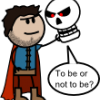How to Make a Compelling Main Character
I wonder what kind of stories tend to come out of processes like yours versus processes like mine?
I don't think there would be much difference in stories produced just based on whether the characters 'come alive', except that mine would be a little more consistent/formulaic (depending whether you want the positive or negative version of the adjective). I do occasionally worry that my story ideas are too similar to each other. But that would only be an important issue if I were actually getting them published/produced. *eyeroll at self*
I want to help design a "sandpark" MMO. Optional interactive story with quests and deeply characterized NPCs, plus sandbox elements like player-craftable housing and lots of other crafting. If you are starting a design of this type, please PM me. I also love pet-breeding games.
Options don't mean alternatives, you could include multiple options at once. But in my post I was against giving critical flaws to MC in order to make the MC "memorable". My subjective reason, as described, is that it feels contrived.
It is one thing to make a character human, it is quite another to snap a critical flaw to a character. That, when it is read from a post, sounds like a quick fix:
"That bland nobility is what Kōtiro was suffering from."
If that is the problem, I would expand on nobility and ask, "Why can nobility be bland? Why isn't nobility intriguing?"
I think that people take good things for granted too much, and they don't realize how hard it is for something good to exist and survive. Nobility can't be bland. How many nobles do you know? It is extremely easy to tarnish and hard to maintain (that is, if your character is human instead of a robot).
Therefore, in this perspective, adding a critical flaw to the hero "to liven her up" is like chickening out from the deeper understanding that nobility is hard. If you understand that nobility is hard, then you see that you can't afford to reduce the character, because the character's struggle is already very hard.
Think of the game characters, especially indie and amateur ones, that you've seen though. How many just put their lives on the line for no clear reason other than they are "good" or nice? I've lost count.
It's boring.
It would be different if these were--like you say--explorations of what it means to be noble, and how being noble is challenging, but they aren't. These are just bland characters who have a trite motivation.
One example of a really interesting main character who was completely not noble, was Wikus, from District 9. He repeatedly showed himself to be petty and cowardly, which made the story much more interesting in terms of character development than something like, say, Independence Day, in which Will Smith plays the generic hero.
If you wanted to do this type of story in a more grown-up way in a game, you face the technical difficulty that it's hard to create internal conflict in the main character of a game, because the player actively works against this. Gamers are typically very decisive people, they pick one goal and drive for it hardcore, or try to carefully balance between two goals. They don't emotionally agonize about which goal to go for. It's quite difficult to make a gamer feel temptations the character would be feeling in the same situation (take a day off, spend money on beer or a brothel). Similarly with fears - gamers are typically not afraid for their lives in games, and hate games which would give them a reason to be afraid of dying. So gamers don't see themselves as risking their lives when they go around doing quests. They think of themselves as either playing the game, or working at a job the game gives them.
Another problem is the fact that gamers are used to games which don't reward them for acting noble. The noble choice is often to NOT kill things, and games are usually about killing things. The average gamer is also used to being asked to steal things, and used to being given some kind of valuable reward for their effort which, in a realistic setting, many NPCs couldn't afford to pay.
I want to help design a "sandpark" MMO. Optional interactive story with quests and deeply characterized NPCs, plus sandbox elements like player-craftable housing and lots of other crafting. If you are starting a design of this type, please PM me. I also love pet-breeding games.
As for theme, I just puke out what I can and then see if there is a theme or plot in what I wrote.
Then, on the second draft or whenever I realize exactly what it is I'm writing, I go back and revise it with this theme in mind to enrich it a bit.
Incidentally, I read a very similar thing this week in Stephen King's book "On Writing".
I recommend it, and don't skip parts about writing narration.
And, as an aside, it's really fun to trawl through TV tropes and see if you're accidentally regurgitating something mindlessly. Using tropes, cliches, and even regurgitating pop culture is both OK and unavoidable but if you are doing so mindlessly, the results will most likely not be enjoyable or successful entertainment.
'course games are judged on far more than writing, and I'll get to that, but we're talking about writing now.
As it all relates to video games, video games contain a lot of great examples of good, great and terrible writing.
My #1 favorite bad example: Chaos Rings. "Chaos" itself is a platitude; a random filler word that amateurs throw around. Like "Oblivion"; every game I've seen with "Oblivion" in the title has putrid writing. It's one of this blaring red flag. To expand on what I mean, the story is extremely unchaotic. You're in a very formalized, strictly ruled arena format overseen by a robot, and we all know computers are the ultimate bureaucracy machine.
That may sound like nitpicking, but actually I describe that because that's a persistent theme in the writing. The actual dialog and everything is a lot of really grand sounding text trying to paint pathos that just isn't there.
It doesn't work that way though, and it comes off like it was plotted by a non-writer and the writer was told to fill in blanks.
I know someone who writes at about this quality - and come to think of it even used the term "Chaos" a lot - and if he wasn't mentally disabled (not that there's anything wrong with that), he'd probably be writing games like that.
Of course it was a perfectly fine and successful product and I enjoyed it; if we're looking at the big picture, the market doesn't always judge a game on its story. But we are looking at the writing here, and that is also perfectly OK because good writing can help the final product and its sales. Moving on...
For contrast I'd recommend just playing through Half Life 2.
HL2 is good writing. There are some bits that bug me, but it's not randomly regurgitated anything. It's a lot of careful design.
The infodump at the beginning with the g-man serves the role of characterizing the g-man himself, who's fun to watch.
You appear in a train. Someone says "Oh, I didn't see you there", thus suggesting that you actually did just pop in.
Then you get off and everything characterizes the situation so, so well.
In addition to King's book, I also suggest the articles here, especially by Alex Keegan.
I can image doing what you describe wrt plot though: just making it up, then analyzing it afterwards to see what's there. Problem is, there tends not to _be_ much plot there. When I first started to write fiction I made things up as I went along instead of outlining. What came out was a bit of soap opera heavily laden with introspection. Slow, wandering, not a compelling read. And I hate throwing out a lot of material and rewriting. I like analyzing what I want to do and feeling like I have a goal and a plan. So, that's why I have a writing process totally different from King's and that of other 'seat of the pantsers'.
I want to help design a "sandpark" MMO. Optional interactive story with quests and deeply characterized NPCs, plus sandbox elements like player-craftable housing and lots of other crafting. If you are starting a design of this type, please PM me. I also love pet-breeding games.
Quote: It would be different if these were--like you say--explorations of what it means to be noble, and how being noble is challenging, but they aren't. These are just bland characters who have a trite motivation.I think that it is irrelevant to note what others do, because this thread is about your design, so the relevant question is why wouldn't you?
Forget about the million ways that others could do it wrong. Just think about what you want to do right. I wasn't commenting on how others do things, I was questioning your decision in your character design.
Re: sunandshadow
Quote: If you wanted to do this type of story in a more grown-up way in a game, you face the technical difficulty that it's hard to create internal conflict in the main character of a game, because the player actively works against this. Gamers are typically very decisive people, they pick one goal and drive for it hardcore, or try to carefully balance between two goals.The type of challenges related to nobility could be emotional, but when I wrote my response I was mainly speaking of the operational challenges, e.g. how does a noble person survive in a world that is corrupted. The most severe problem about nobility isn't deciding to be noble, but how to be so while getting things done and without getting killed. If you think along this path, you see that such a challenge is very compatible with games.
Trying to get things done in the noble way is the hard way. Villains have it easy.
Then, on the second draft or whenever I realize exactly what it is I'm writing, I go back and revise it with this theme in mind to enrich it a bit.
Incidentally, I read a very similar thing this week in Stephen King's book "On Writing".
IMHO The book of Stephen King has many biographic contents. You can find a little more on the book Revision and self-editing.
Wai, I agree with you that nobility is hard (good lord do I know that...).
Think of the game characters, especially indie and amateur ones, that you've seen though. How many just put their lives on the line for no clear reason other than they are "good" or nice? I've lost count.
It's boring.
I don't know. It could depend from many causes (such struggling with too easy or too cliched enemies).
And if you create a character with only one value (noble) the character could become too plain.
I know some good examples of characters that show the element nobility. But they face challenges that they can't overcome without being "rutheless".
Two examples are Jack Bauer (24 - serial tv) and Geralt of Rivia (The Witcher - book of Andzrej Sapckowski).
They both be used in videogames.
I recommend dropping "good" as a character trait. The idea that someone can be inherently "good" only smothers truth.
You don't need to graft a superficial flaw onto her. She already has a flaw: her own traits potentially conflict with each other.
Provoke an internal change by way of an external change of circumstance. A conflict that can't be resolved by staying absolute to her traits. Examples:
It's not brave to be strong - and so she relinquishes power.
It's not strong to be brave - power will be lost if she takes a desired action.
It's not smart to be kind - only the ruthless will survival.
It's not kind to be smart - the truth is painful and unnecessary.
Etc.







